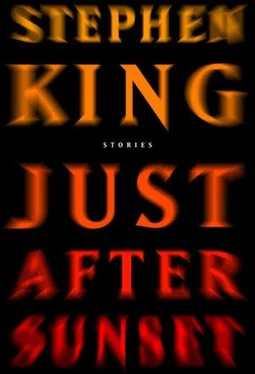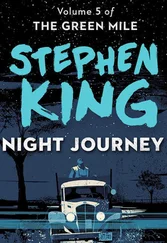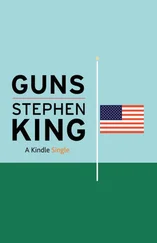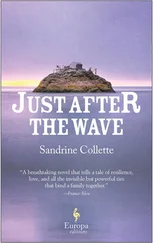Stephen King - Just After Sunset
Здесь есть возможность читать онлайн «Stephen King - Just After Sunset» весь текст электронной книги совершенно бесплатно (целиком полную версию без сокращений). В некоторых случаях можно слушать аудио, скачать через торрент в формате fb2 и присутствует краткое содержание. Город: New York, Год выпуска: 2009, ISBN: 2009, Издательство: SCRIBNER, Жанр: Ужасы и Мистика, на английском языке. Описание произведения, (предисловие) а так же отзывы посетителей доступны на портале библиотеки ЛибКат.
- Название:Just After Sunset
- Автор:
- Издательство:SCRIBNER
- Жанр:
- Год:2009
- Город:New York
- ISBN:978-1-4391-2548-9
- Рейтинг книги:5 / 5. Голосов: 1
-
Избранное:Добавить в избранное
- Отзывы:
-
Ваша оценка:
- 100
- 1
- 2
- 3
- 4
- 5
Just After Sunset: краткое содержание, описание и аннотация
Предлагаем к чтению аннотацию, описание, краткое содержание или предисловие (зависит от того, что написал сам автор книги «Just After Sunset»). Если вы не нашли необходимую информацию о книге — напишите в комментариях, мы постараемся отыскать её.
Just After Sunset — читать онлайн бесплатно полную книгу (весь текст) целиком
Ниже представлен текст книги, разбитый по страницам. Система сохранения места последней прочитанной страницы, позволяет с удобством читать онлайн бесплатно книгу «Just After Sunset», без необходимости каждый раз заново искать на чём Вы остановились. Поставьте закладку, и сможете в любой момент перейти на страницу, на которой закончили чтение.
Интервал:
Закладка:
Just after sunset
For Heidi Pitlor
“I can fancy what you saw. Yes; it is horrible enough; but after all, it is an old story, an old mystery played… Such forces cannot be named, cannot be spoken, cannot be imagined except under a veil and a symbol, a symbol to the most of us appearing a quaint, poetic fancy, to some a foolish tale. But you and I, at all events, have known something of the terror that may dwell in the secret place of life, manifested under human flesh; that which is without form taking to itself a form. Oh, Austin, how can it be? How is it that the very sunlight does not turn to blackness before this thing, the hard earth melt and boil beneath such a burden?”
Arthur Machen, "The Great God Pan"Introduction
One day in 1972, I came home from work and found my wife sitting at the kitchen table with a pair of gardening shears in front of her. She was smiling, which suggested I wasn’t in too much trouble; on the other hand, she said she wanted my wallet. That didn’t sound good.
Nevertheless, I handed it over. She rummaged out my Texaco gasoline credit card — such things were routinely sent to young marrieds then — and proceeded to cut it into three large pieces. When I protested that the card had been very handy, and we always made at least the minimum payment at the end of the month (sometimes more), she only shook her head and told me that the interest charges were more than our fragile household economy could bear.
“Better to remove the temptation,” she said. “I already cut up mine.”
And that was that. Neither of us carried a credit card for the next two years.
She was right to do it, smart to do it, because at the time we were in our early twenties and had two kids to take care of; financially, we were just keeping our heads above water. I was teaching high school English and working at an industrial laundry during the summer, washing motel sheets and occasionally driving a delivery truck around to those same motels. Tabby was taking care of the kids during her days, writing poems when they took their naps, and working a full shift at Dunkin’ Donuts after I came home from school. Our combined income was enough to pay the rent, buy groceries, and keep diapers on our infant son, but not enough to manage a phone; we let that go the way of the Texaco card. Too much temptation to call someone long distance. There was enough left over to occasionally buy books — neither of us could live without those — and to pay for my bad habits (beer and cigarettes), but very little beyond that. Certainly there wasn’t money to pay finance charges for the privilege of carrying that convenient but ultimately dangerous rectangle of plastic.
What left-over income we did have usually went for things like car repairs, doctor bills, or what Tabby and I called “kidshit”: toys, a second-hand playpen, a few of those maddening Richard Scarry books. And that little bit of extra often came from the short stories I was able to sell to men’s magazines like Cavalier , Dude , and Adam . In those days it was never about writing literature, and any discussion of my fiction’s “lasting value” would have been as much a luxury as that Texaco card. The stories, when they sold (they didn’t always), were simply a welcome bit of found money. I viewed them as a series of piсatas I banged on, not with a stick but my imagination. Sometimes they broke and showered down a few hundred bucks. Other times, they didn’t.
Luckily for me — and believe me when I say that I have led an extremely lucky life, in more ways than this one — my work was also my joy. I was knocking myself out with most of those stories, having a blast. They came one after another, like the hits from the AM rock radio station that was always playing in the combination study-and-laundry-room where I wrote them.
I wrote them fast and hard, rarely looking back after the second rewrite, and it never crossed my mind to wonder where they were coming from, or how the structure of a good short story differed from the structure of a novel, or how one manages issues of character development, backstory, and time-frame. I was flying entirely by the seat of my pants, running on nothing but intuition and a kid’s self-confidence. All I cared about was that they were coming. That was all I had to care about. Certainly it never occurred to me that writing short stories is a fragile craft, one that can be forgotten if it isn’t used almost constantly. It didn’t feel fragile to me then. Most of those stories felt like bulldozers.
Many bestselling novelists in America don’t write short stories. I doubt if it’s a money issue; financially successful writers don’t need to think about that part of it. It might be that when the world of the full-time novelist shrinks to below, say, seventy thousand words, a kind of creative claustrophobia sets in. Or maybe it’s just that the knack of miniaturization gets lost along the way. There are lots of things in life that are like riding a bike, but writing short stories isn’t one of them. You can forget how.
During the late eighties and nineties, I wrote fewer and fewer stories, and the ones I did write were longer and longer (and there are a couple of the longer ones in this book). That was okay. But there were also short stories I wasn’t writing because I had some novel or other to finish, and that wasn’t so okay — I could feel those ideas in the back of my head crying to be written. Some eventually were; others, I’m sad to say, died and blew away like dust.
Worst of all, there were stories I no longer knew how to write, and that was dismaying. I knew I could have written them in that laundry room, on Tabby’s little Olivetti portable, but as a much older man, even with my craft more honed and my tools — this Macintosh I’m writing on tonight, for instance — much more pricey, those stories were eluding me. I remember messing one up and thinking of an aging sword-maker, looking helplessly at a fine Toledo blade and musing, I used to know how to make this stuff .
Then one day three or four years ago, I got a letter from Katrina Kenison, who edited the annual Best American Short Stories series (she has since been succeeded by Heidi Pitlor, to whom the book you are holding is dedicated). Ms. Kenison asked if I’d be interested in editing the 2006 volume. I didn’t need to sleep on it, or even think it over on an afternoon walk. I said yes immediately. For all sorts of reasons, some even altruistic, but I would be a black liar indeed if I didn’t admit self-interest played a part. I thought if I read enough short fiction, immersed myself in the best the American literary magazines had to offer, I might be able to recapture some of the effortlessness that had been slipping away. Not because I needed those checks — small but very welcome when you’re just starting out — to buy a new muffler for a used car or a birthday present for my wife, but because I didn’t see losing my ability to write short stories as a fair exchange for a walletload of credit cards.
I read hundreds of stories during my year as guest editor, but I won’t go into that here; if you’re interested, buy the book and read the introduction (you’ll also be treating yourself to twenty swell short stories, which is no poke in the eye with a sharp stick). The important thing as it affects the stories that follow is that I got excited all over again, and I started writing stories again in the old way. I had hoped for that, but had hardly dared believe it would happen. The first of those “new” stories was “Willa,” which is also the first story in this book.
Читать дальшеИнтервал:
Закладка:
Похожие книги на «Just After Sunset»
Представляем Вашему вниманию похожие книги на «Just After Sunset» списком для выбора. Мы отобрали схожую по названию и смыслу литературу в надежде предоставить читателям больше вариантов отыскать новые, интересные, ещё непрочитанные произведения.
Обсуждение, отзывы о книге «Just After Sunset» и просто собственные мнения читателей. Оставьте ваши комментарии, напишите, что Вы думаете о произведении, его смысле или главных героях. Укажите что конкретно понравилось, а что нет, и почему Вы так считаете.












